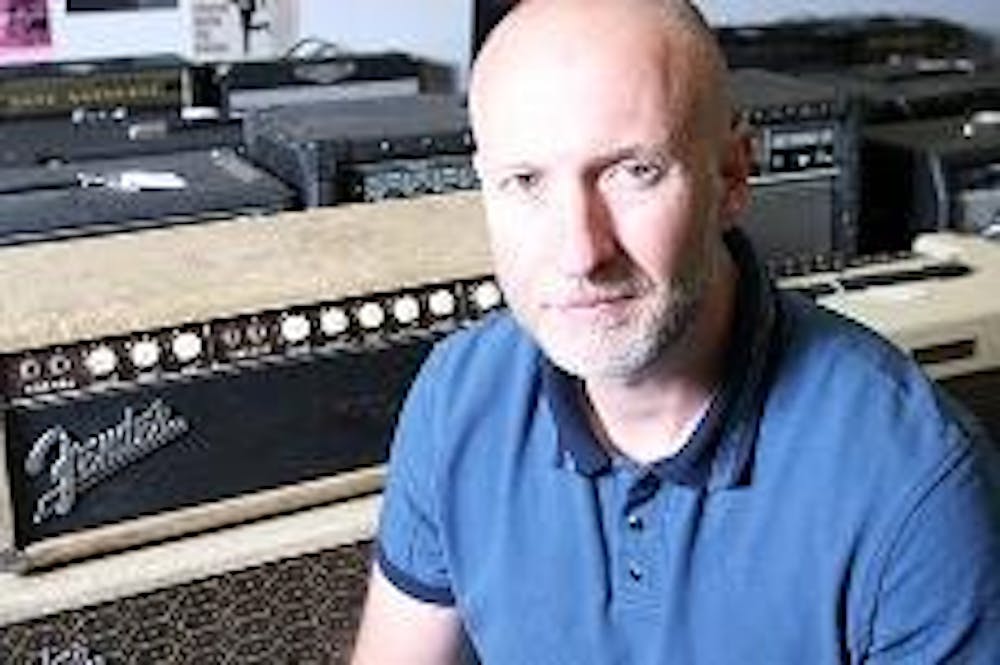The name of seminal '80s post-punk band HÂsker DÂ is also Danish for "Do you remember?" This is a question many older fans of the band's lead guitarist and singer-songwriter Bob Mould may be asking in the wake of his latest project's eponymous release, "Blowoff."
The recorded incarnation of his monthly dance party at the 9:30 club, co-hosted with fellow electronica-dance artist and producer Rich Morel, marks a drastic deviation from the bravado of HÂsker DÂ's sound toward the more danceable, electronica style mostly popularized and appreciated by members of the gay community, many of whom constitute the bulk of Blowoff fans. Despite mixed reactions to the trajectory of his career, Mould remains quite proud of and unfazed by the decades-long transformation of his musical mettle.
"At the time, when I first got involved with HÂsker DÂ, I was very much a fan of the first wave of New York punk rock, and the early British bands like the Buzzcocks. I was going to college and the other guys were working at the record store [in Minneapolis] and I was young, angry and I wanted to change the world," Mould said of the youthful ambitions that provided the initial thrust for his career.
"Politically-charged songs don't interest me anymore," he said.
After the 1988 dissolution of HÂsker DÂ, Mould embarked on a solo career. In blind pursuit of his own vision, he ignored creatively stifling genre and fan expectations to purvey his signature distorted, incendiary guitar riffs and opted for acoustic guitar-driven pop and folk-rock ballads instead.
"How people define what I want to do, I can't control. I could care less about categorization. Labels and definitions change so much I can't really worry about them. 'Workbook' was a pretty focused, sort of folk-rock work and it got a great response," Mould said of escaping the inherent pressure to continue the punk-pop, alternative-rock sound he helped pioneer.
"I was always into experimenting with different things [and] sounds. I still like loud guitars a lot, but I'm a pop songwriter, and 'pop' is a funny word-the definition changes from decade to decade," he said.
From his first album "Workbook," "See a Little Light," a lithely melodic sing-along, is noticeably lighter than the songs Mould wrote and sang during his HÂsker DÂ years, yet the album as a whole remains characteristically Mould: dark, introspective and experimental. Mould's fascination with aberrantly dark pop-songwriting continued with his second solo venture, "Black Sheets of Rain," the title track being the highlight of the somewhat structurally uniform album.
In 1992, Mould founded Sugar with bassist David Barbe and drummer Malcolm Travis, a power-pop trio that remains Mould's most successful project to date. Their first album "Copper Blue" received uniformly positive reviews, but the band's final two albums, "Beaster" and "File Under: Easy Listening," failed to achieve the same level of success and Sugar dissolved in 1995.
In 2002, as his penchant for electronic beats emerged, so did Mould's desire to leave New York. After moving to D.C., he serendipitously met another DJ and the pair collaborated, forming the Blowoff dance party. Having worked with the 9:30 club's owner for over 20 years, Mould and Morel were offered a permanent monthly slot in the venue's lineup.
"We didn't really have a plan at all in starting Blowoff. We just got together and had fun with sound and words-there was absolutely no agenda. All the stuff you hear on the 'Blowoff' record was just a case of happy accident. It's just a sexy gay dance party to us. I play a lot of indie rock, Rich plays a lot of house music, people come to have a good time and dance. I understand that the crowd or scene may keep some people from coming, but there are plenty of my fans there, gay and straight," he said.
In addition to DJing, Mould also produces and mixes for other artists like Interpol and VHS or Beta under the name "LoudBomb."
"LoudBomb is actually an anagram of my professional name," Mould said. "It's a good place for the more electronic, dance-y side of what I do. People don't usually associate it with Bob Mould, guitarist from HÂsker DÂ."
From the Minneapolis underground to the D.C. dance floor, Mould has never pledged allegiance to any particular genre, fan-base or role in the music industry.
"The DJ thing has been fun. As I get older, I value time with friends and family more and I find myself more interested in the writing process. One thing I'd love to do next is write for film. I like the idea of writing outside of myself. I would also like to write for traditional pop artists," he said.





